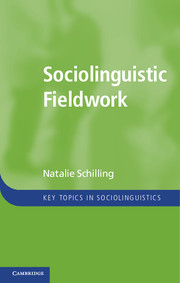7 - Giving back to the community
Published online by Cambridge University Press: 05 April 2013
Summary
This book has taken us on a long journey through sociolinguistic fieldwork. Along the way, we have considered not only practical and theoretical matters but also relational and ethical issues. When we conduct research with and about human communities, we necessarily interact with those communities. In other words, we as sociolinguistic researchers are not simply observers but, some extent, participants as well. Because participant-observer status entails a dual insider–outsider perspective, we have to think about just how far “inside” the community we should go – that is, how involved we should become with our research communities and in what ways. Clearly, we must engage in at least ethical involvement. That is, we should ensure that people’s privacy is protected, that no one comes to harm, and that our research participants are compensated for any inconvenience and discomfort they may experience as a result of taking part in our research project. However, most sociolinguists maintain that we should involve ourselves more fully than this, adopting a position of advocacy, in which we actively seek ways to work for the community of study rather than simply conducting research on them, or a position of empowerment, in which we actively work with community members to help them help themselves (Cameron, Frazer, Harvey, Rampton, and Richardson 1992).
Sociolinguists believe in community involvement for a number of important reasons. For one, when people agree to participate in our studies, they give us a lot, including their time, their voices, their thoughts, and even expression of their innermost hopes and desires. In addition, we gain a lot from our research participants – not just valuable linguistic and sociolinguistic knowledge, but also practical and personal gain in the form of degrees, jobs, career advancement, and possibly even (limited) fame. We owe our research participants at least something in return. Further, since we often enter the community and gain valuable contacts through capitalizing on being a friend of a friend, we need to remember that this position confers obligations as well as rights (Milroy and Gordon 2003: 75–78). It would be unfair and unethical for us to simply pose as someone in this important position, and it is our obligation to participate in both the “give” and the “take” that being a friend of a friend entails. Friends of friends are important precisely because they do things for one another, and the value of these connections breaks down if we abuse our position by capitalizing on a friend’s name solely for our own gain.
- Type
- Chapter
- Information
- Sociolinguistic Fieldwork , pp. 268 - 286Publisher: Cambridge University PressPrint publication year: 2013



